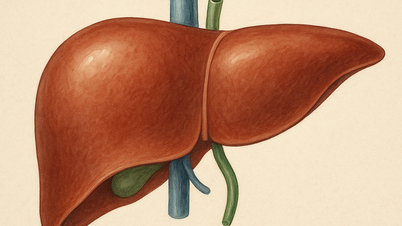Notably, even in people with normal cholesterol, studies have demonstrated a significant correlation between high sugar consumption and a higher risk of heart disease and stroke.
New research recently published in the medical journal BMC Medicine has found a surprising culprit that significantly increases the risk of heart disease and stroke.

Studies have shown a correlation between high sugar consumption and an increased risk of heart disease and stroke.
Photo: AI
Scientists from the University of Oxford (UK) analyzed data from the UK Biobank of more than 110,497 participants aged 37 - 73 over 9 years.
The authors examined multiple dietary assessments to estimate the amount of carbohydrates consumed by participants, focusing specifically on added sugars and comparing them to incidences of cardiovascular disease. Added sugars are not sugars naturally found in whole fruits and vegetables.
The most common forms of sugar consumed by participants were canned goods, confectionery, packaged fruit juices, sugary drinks and desserts, said study author Cody Watling, a PhD student at the University of Oxford.
During the study period, there were 4,188 cases of cardiovascular disease (heart disease and stroke combined), 3,138 cases of heart disease, and 1,124 cases of stroke.
Eating a lot of added sugar increases the risk of heart disease, stroke
The results found that consuming a lot of added sugar from sugary drinks, fruit juices and sweets increased the risk of cardiovascular diseases.

For every 5% increase in added sugar intake, the risk of heart disease increases by 6% and the risk of stroke increases by 10%.
Photo: AI
Specifically, for every 5% increase in added sugar intake, the risk of heart disease increases by 6% and the risk of stroke increases by 10%, according to BMC Medicine.
And people who consume about 95 grams of sugar per day are at the highest risk.
The authors suggest that replacing added sugar with sugar from whole fruit — and higher fiber intake — may help protect against cardiovascular disease.
They concluded that not all carbohydrates increase the risk of cardiovascular disease, but rather the type and source of carbohydrates consumed.
Source: https://thanhnien.vn/tim-ra-thu-pham-dang-ngac-nhien-lam-tang-nguy-co-benh-tim-va-dot-quy-185250418004015594.htm


![[Photo] National Assembly Chairman Tran Thanh Man chairs the meeting of the Subcommittee on Documents of the First National Assembly Party Congress](https://vphoto.vietnam.vn/thumb/1200x675/vietnam/resource/IMAGE/2025/5/8/72b19a73d94a4affab411fd8c87f4f8d)

![[Photo] General Secretary To Lam begins official visit to Russia and attends the 80th Anniversary of Victory over Fascism](https://vphoto.vietnam.vn/thumb/1200x675/vietnam/resource/IMAGE/2025/5/8/5d2566d7f67d4a1e9b88bc677831ec9d)
![[Photo] Prime Minister Pham Minh Chinh meets with the Policy Advisory Council on Private Economic Development](https://vphoto.vietnam.vn/thumb/1200x675/vietnam/resource/IMAGE/2025/5/8/387da60b85cc489ab2aed8442fc3b14a)
![[Photo] General Secretary concludes visit to Azerbaijan, departs for visit to Russian Federation](https://vphoto.vietnam.vn/thumb/1200x675/vietnam/resource/IMAGE/2025/5/8/7a135ad280314b66917ad278ce0e26fa)
![[Photo] President Luong Cuong presents the decision to appoint Deputy Head of the Office of the President](https://vphoto.vietnam.vn/thumb/1200x675/vietnam/resource/IMAGE/2025/5/8/501f8ee192f3476ab9f7579c57b423ad)
















































![[Photo] Prime Minister Pham Minh Chinh talks on the phone with Singaporean Prime Minister Lawrence Wong](https://vphoto.vietnam.vn/thumb/402x226/vietnam/resource/IMAGE/2025/5/8/e2eab082d9bc4fc4a360b28fa0ab94de)
































Comment (0)